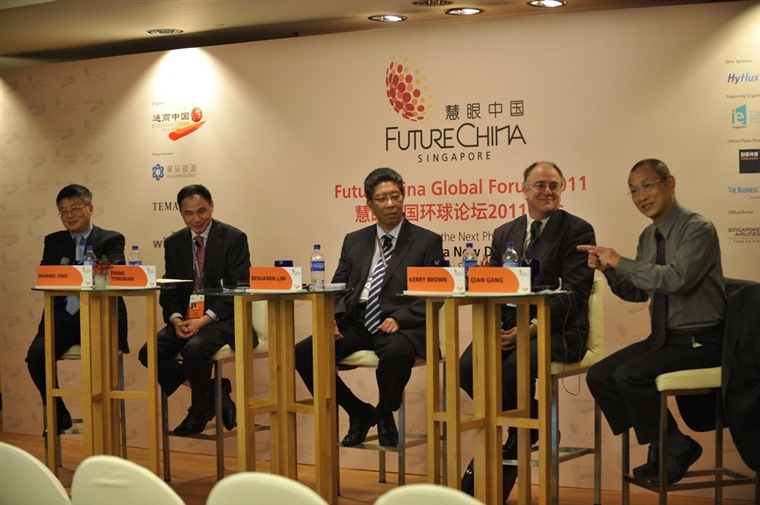The second day was kick started with a debate led by Mr Christian Murck, on whether or not China’s business environment is becoming weighted against foreigners.
Setting the context of China’s current situation, the President of American Chamber of Commerce in the People’s Republic of China recognized that China is at its major economy turning point. He highlighted that there will be major changes in its economic structure and industrial polices.
Following the climax dinner with Business China patron Mr Lee Kuan Yew, the second day of FutureChina Global Forum brought more exciting dialogues with business leaders and thought experts. Starting the day was an intellectually provoking roundtable discussion on China’s evolving socio-political landscape.
Professor Zheng Yongnian, Professor and Director of East Asian Institute of Singapore, commenced the session with his observations on the Chinese political system. He observed that although it had not established formal rules for party democracy, its strength was its term limit for party leaders, to avoid personal dictatorship.
“The age limit of 65 years is very effective in China as the party can refresh very fast…When Singapore first established diplomatic ties with China, it found China old; now China finds Singapore old.” He said, to the audience’s laughter.
Reuters’ specialist correspondent in China Mr Benjamin Lim also shared his 2 “S”s of China’s political system – Surprises and Secrecy. He said that while Xi Jinping and Li Keqiang will most likely become the next leaders of China, surprises should not be ruled out as not everything is “set in stone”.
Similarly, head of the Asia Programme of Chatham House in United Kingdom Dr Kerry Brown also portrayed a paradoxical situation: While China is a fast changing dynamic and increasingly diversified society, it is also a very well-controlled system.
He expressed questions about the legitimacy of the new leadership and political process: “How is the Party going to do a social contract with the various groups of professionals, middle class, migrant labourers and farmers? Will it show a strong political will and a distinctive political flavour?”
Indeed, the next speaker Mr Qian Gang, director of the China Media Project of the University of Hong Kong, shared with the audience how language and ritual of the Chinese Communist Party is expressed and exercised in real life.
“The party has a standardized use of language, from Mao Zedong’s thought to Deng Xiaoping’s theory to the three representatives and scientific development concept…In fact, political phrases have a life, they are born, fall sick, grow old and die just like us. You can even see it as the stock market,” he said, illustrating his idea with a line graph of frequencies of the four political phrases used during Party meetings.
Summarizing the discussion, the speakers largely expressed optimism about the party. Professor Zheng Yongnian justified his opinion: “From 1945 till now, the Party has dealt with many crises. Further progress can be made with the change in leadership.”
Ms Ge Yang, editor of Beijing based website Umiwi.com, said that the session was interesting: “The media portrays the speakers as very serious people, but in this session, I have seen that they are totally different – they are straightforward and willing to throw questions to each other. I have also learnt a lot from this session – I see aspects of China different from what I thought when I was in China.”
Closing the day was the Plenary Luncheon, where Mr J. Stapleton Roy, director of the Kissinger Institute on China and the United States, shared his insights on the prospects for US-China relations and general perceptions: “Perceptions really do matter. The American media is portraying a much more negative image of Chinese…It is important to have a balanced picture of China and ensure that the US-China relationship develops in a positive way. The media is important in building positive perceptions.”
A giant challenge for Chinese leaders would be the uprising of nationalism. However, Mr Roy expressed faith in them as they have looked at the mistakes made by other countries and are determined not to repeat those mistakes. He gave the example of Hu Jintao’s “Peaceful rising” as China’s soft diplomacy powers.
He concluded by saying that US-China relations will “remain good and positive, as long as leaders are prepared to take measures to maintain them.”
Chief Executive Officer of Business China, Ms Low Yen Ling thanked the speakers, delegates and sponsors in her closing remarks, and acknowledged China’s economic influence on the global economy: “If China sneezes, the whole world will catch a cold.”
Godwyn Group of Companies’ Chief Executive Officer Mr Godwyn Lim agreed with Ms Low’s phrase. As a whole, he also commended on the luncheon: “The ambassador had very good insight, especially on the Cold War. It was very factful – there’s seldom anyone so bold as to warn others about the relationship between China and the US about what they should and should not do.”
At the end of the one and a half day forum, Channel News Asia Presenter Melissa Hyak talked about her favourite speaker for the forum, Professor Robert Ross, Associate of John King Fairbank Centre for Chinese studies of Harvard University: “Robert Ross had a different view of China, that in becoming stronger, China also deepened its own fragility, in terms of its widening income gap and opportunity gap. The key takeaway I had was a different perspective of China.

